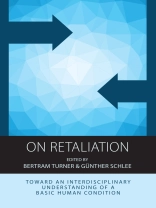Retaliation is associated with all forms of social and political organization, and retaliatory logics inform many different conflict resolution procedures from consensual settlement to compensation to violent escalations. This book derives a concept of retaliation from the overall notion of reciprocity, defining retaliation as the human disposition to strive for a reactive balancing of conflicts and injustices. On Retaliation presents a synthesized approach to both the violence-generating and violence-avoiding potentials of retaliation. Contributors to this volume touch upon the interaction between retaliation and violence, the state’s monopoly on legitimate punishment and the factors of socio-political frameworks, religious interpretations and economic processes.
Jadual kandungan
List of Figures and Tables
Acknowledgements
Introduction: On Retaliation: Conceptual Plurality, Transdisciplinary Research, Rifts, Blurrings and Translations
Bertram Turner
SECTION I: RETALIATION AND THE HUMAN NATURE: THE SEARCH FOR UNIVERSALITIES?
Chapter 1. Revenge and Retaliation: A Social-functionalist Approach
Mario Gollwitzer and Arne Sjöström
Chapter 2. In The Heart of the Moment: The Influence of Visceral Factors on Retaliation
Robert J. Bies and Thomas M. Tripp
SECTION II: RETALIATION IN PSYCHOLOGICAL AND ECONOMIC ANALYSES OF CRIME AND DEVIANCE
Chapter 3. A Criminal is a Victim is a Criminal? An Economist’s View on the Victim-Offender Overlap
Horst Entorf
Chapter 4. Laypeople’s Reactions to Deviancy as Determined by Retributive Motives
Margit E. Oswald
SECTION III: RETALIATION AND PUNISHMENT: ENCOUNTER OF FORMAL AND INFORMAL NORMATIVITIES
Chapter 5. Violent Crimes and Retaliation in the European Criminal Justice System between the Seventeenth and Nineteen Centuries
Karl Härter
Chapter 6. Crime in Motion: Predation, Retaliation and the Spread of Urban Violence
Richard Wright, Volkan Topalli and Scott Jacques
SECTION IV: FAITH-BASED RETALIATION: SPIRITUALITY AND NORMATIVITY OF THE RETALIATORY GRAMMAR
Chapter 7. Crime and Punishment: Intentionality and Diya in Algeria and Sudan
Yazid Ben Hounet
Chapter 8. ‘Bewitched People and Bad Luck Everywhere!’ Disputing and Magical Retaliation in Si Swati-Speaking Southern Africa
Severin Lenart
SECTION V: RETALIATION IN NEGOTIATIONS AND ORGANIZATIONS OF SOCIAL AND POLITICAL ORDERS
Chapter 9. Forum Shopping as Retaliation in Disguise: How Nomadic Fulbe Condemn Retaliation and Forum Shopping, but Practise Them Anyway
Albert K. Drent
Chapter 10. Customary Law and the Joys of Statelessness: Somali Realities beyond Libertarian Fantasies
Günther Schlee
SECTION VI: TRAVELLING MODELS OF RETALIATION: POST-CONFLICT SCENARIOS IN INTERNATIONAL LAW AND ON THE GROUND
Chapter 11. Retaliation in Postwar Times: An Analysis of the Rhetoric and Practices of Retaliation in Bamyan, Afghanistan, 2009
Friederike Stahlmann
Chapter 12. The International Criminal Court Reparation System: Punishment, Retaliation, Restoration
Pietro Sullo
Conclusion: Retaliation in Specific Spheres of Effectiveness
Bertram Turner
Index
Mengenai Pengarang
Günther Schlee is one of the Founding Directors of the Max Planck Institute for Social Anthropology in Halle, Germany. He conducted fieldwork in Kenya, Ethiopia and Sudan, and was a guest lecturer in Padang (Sumatra) and at the Ecole des Hautes Etudes en Science Sociales in Paris. Currently, he is one of the spokespersons of the International Max Planck Research School on Retaliation, Mediation and Punishment












